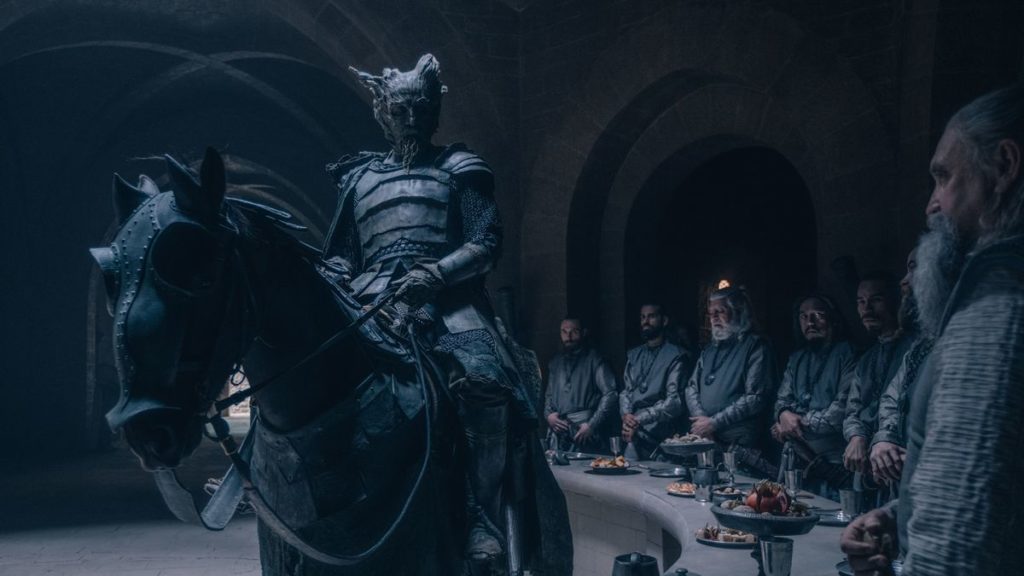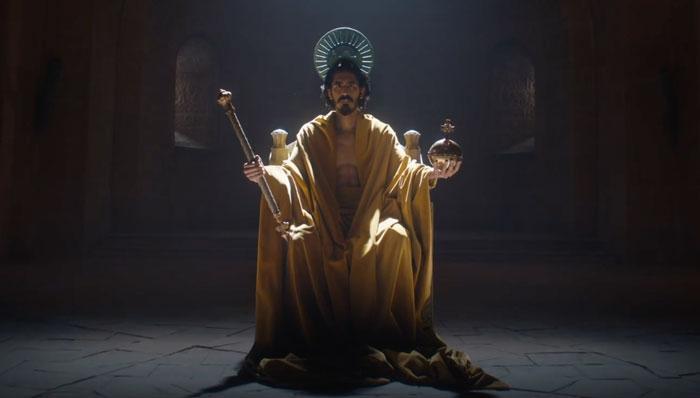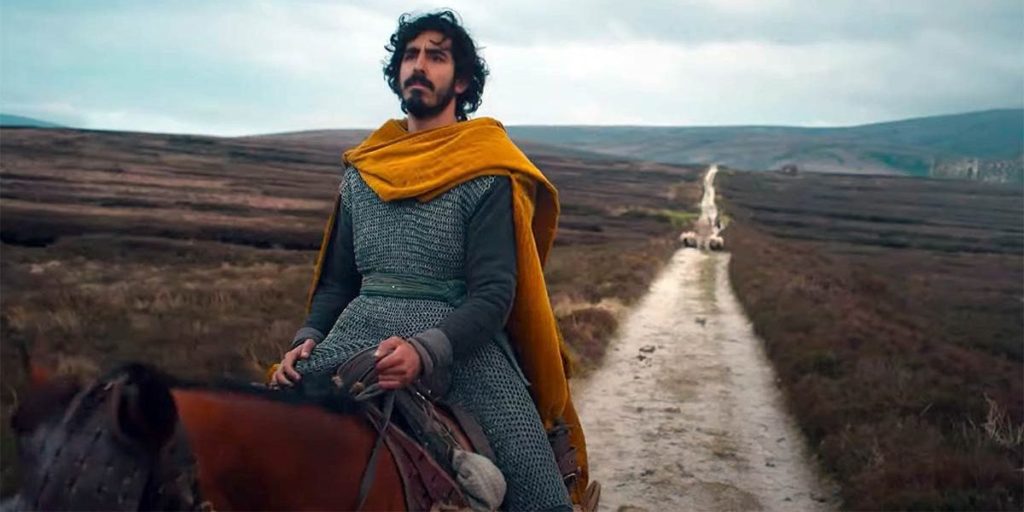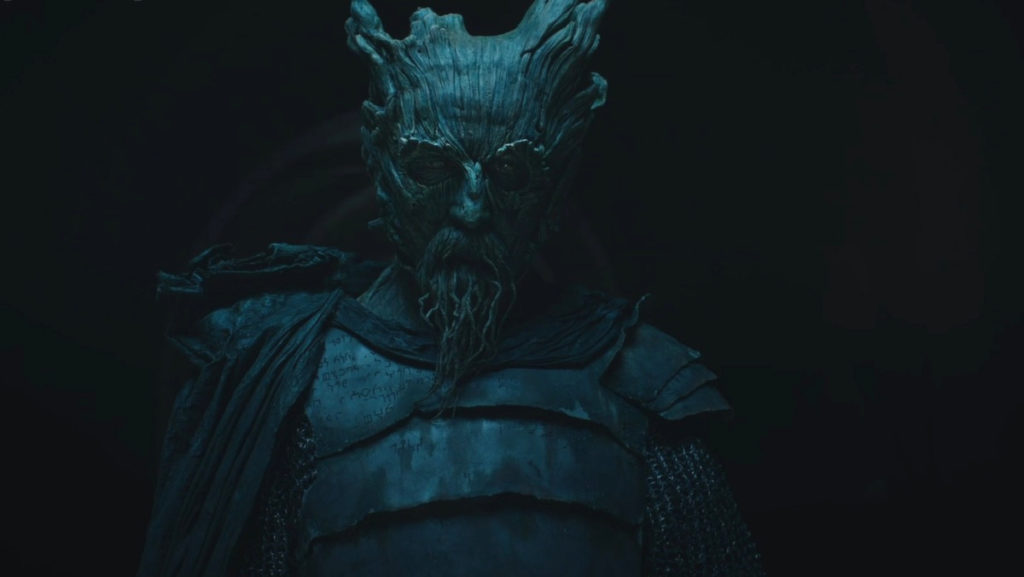Caution: Spoilers for The Green Knight poem and film
When I first saw the trailer for A24’s The Green Knight, I was excited. This was an Authurian legend I knew well and studied at my Alma Mater. It was trippy, dreamy, and about a young knight who’s partied so long he doesn’t know when, or if, the right moment will come to become a true knight of the round table.
Sir Gawain, as we find, does have his moment. A Green Knight comes into the castle and challenges Authur and his knights to a challenge. Lay a blow on him, and in 1 year, he’ll lay the blow in kind. Full of gusto and wine, Gawain accepts and chops the knight’s head off. Unfortunately, Gawain didn’t know this wasn’t an ordinary man. The Green Knight picks his head up and says, “one year,” before leaving cackling laughing.

Gawain spends the next year living pretty much as though there was nothing to do, until he gets closer to the date. He decides he must, for honor’s sake, and travels deep into the woods and finds even more magic away from civilization.
The reason why we’re not visiting Arthur or Lancelot again is, to me, telling. This is a point the filmmaker David Lowery is trying to make: out of everyone right now, Gawain is the most relatable. And I think he’s right on the money.
Gawain may be young, but he’s not that young. Rather, he is constantly asked what he will do with his life. This march towards death seems to be the only thing Gawain believes he is destined for.
And while the film may be drawing from the likes of Scorsese or Kurosawa for its dream-like imagery, that muddles the message a little more. But it’s all justified and genuinely beautiful. The phrase “Every Frame a Painting ” comes to mind with the cinematography and art direction. It screams, “Nominate me and Dev Patal’s eyes for everything!”

You need that magical sense of confusion for how oddball the Faerie-esque woods can get in Arthurian Legends. Remember, the woods were unfettered, unbridled wilderness in a pagan nation. So a lot of these legends are about those civilized folk who get lost in the woods. There were talking animals, nature spirits, and everything the old religions revered and respected. The Green Knight falls right in line with these.
He’s got some hardcore Nature Cleric vibes, for my D&D pals out there on the Internet. BTW, LFG!!
The crux of this story (the poem anyway) is, actually, the reveal. There is a great twist at the end, but it can also really take the wind out of the sails of this ship. I said spoilers earlier but here’s another warning just in case.
***SPOILER WARNING***
At the end of the poem, it is revealed his aunt and uncle were actually involved the entire time. The Green Knight is actually his uncle in disguise. The way Gawain was able to survive the encounter, with a Green Girdle that protects the wearer from death, was given to Gawain by his aunt in secret. He was meant to tell the uncle, but hid it from him, therefore “failing” the true test of honor. Gawain is sent home to tell the knights, where they unceremoniously laugh at him and all wear these Green Girdles on their shoulder, like Gawain. But unlike Gawain’s reasoning, intense shame and dishonor, the others do it mockingly.
And this is why this story is perfect for our time and the Millennial generation.

This is an extremely harrowing journey for Sir Gawain. And, it is filled with magical danger and the threat of death at any time. He is, the entire time, trudging towards death and reflecting on his entire life. In many ways, Gawain does actually die by that third swing by The Green Knight. Because up until this journey, Gawain was already dishonorable. The admission that he makes at the end to the knights, barring his soul, is the most honorable thing the young man has ever done.
And they laugh at him.
Because they heard his uncle and aunt were involved, that he wasn’t in actual danger, they think he should have just shrugged it off. Meanwhile, Gawain feels more shame because this was his own family he betrayed. I’d argue if the shoe was on the other foot, the other knights might have taken it more seriously.
It’s a moment that feels deflating and relatable. That, thousands of years ago, they were writing about people lost in the world. Even one such as Gawain, who has a path laid out for him, can’t seem to quite figure out when to jump on that path. And when he does so, it is so haphazard (definitely the “I Choose Violence” option) that it shocks everyone.
However, in the film, it’s left more ambiguous. Gawain, despite his misgivings, does face his fate. We are left unknowing whether or not he dies. There are sequences where he seems to give up and we flash to his past year of revelry and praises of honor. Then, he does go in, and then it’s kind of an unceremonious cut to black.

But, the director admitted to Vanity Fair last week, he did in fact shoot the ending of Gawain’s head being cut off. But it felt so abrupt that he didn’t like it. Lowrey decided, after discussions with some cast and crew, that leaving it more ambiguous was the right idea.
I feel that making Gawain face his honor was a good thing, but it also shows the true price of facing one’s honor. In some ways, maybe Gawain died but also lived. Maybe that boy died in there, like the poem, and the man came home to face the music and became a king. But a physical, final death, feels more fitting and more true to the way we view the world now. Or maybe how we should see it.
Underneath all of the spectacle and special effects, under all the crazy art and chilverious monologues, this is a story about a man where the world at large is lost on him. A man who would rather annihilate his senses than come to face his destiny. And when fate thrusts upon him an opportunity, unthinkingly, in a haze, he acts. Then all of the regret for all the mistakes he made from inexperience. For being a stupid, brash little boy.
But that is growing up. For everyone. For us. For our kids. For a knight of Arthurian legend. Regret for mistakes and lost time is both universal and equal in pain for all. It’s who moves on from those moments that become great warriors in their own lives.
That’s why you need to go see it however you can.



